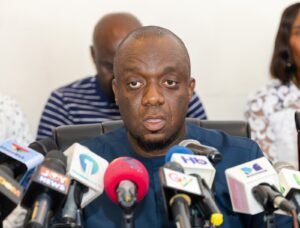
Vice-President Mahamudu Bawumia
This, he said, must be done with emphasis on the maximisation of resources, investments in agriculture, improved health and industrialisation, as well as enhancing critical skills and education, and promoting renewable energy and energy efficiency.
“Our development priorities are focused on economic transformation through value-addition to create jobs, reduce poverty, and enhance social inclusion while sustaining the integrity of our environment,” he said.
Dr. Bawumia, who spoke yesterday in Accra at the 18th Plenary of the Group of Earth Observations Week, said the country’s medium and long-term development plans are underpinned by the “Ghana Beyond Aid” vision to change the mindsets of citizens towards an increased reliance on internal resources plus private sector investment to lead economic transformation.
Dr Bawumia disclosed that government is finalising a new Digital Economy Policy and a Digital Transformation Blueprint to position Ghana as the leader in ICT innovation in Sub-Saharan Africa.
“The ongoing Ghana Digital Acceleration Project is expected to increase access to mobile internet and broadband services by encouraging private sector investment in last-mile connectivity in underserved and rural areas, with particular attention to women, persons with disabilities and the youth,” he said.
He added: “We are working through bilateral and multilateral partnerships to put in place concrete actions to boost resource efficiency, establish a circular economy, mitigate, and adapt to climate change, mitigate disaster risks and halt biodiversity loss.”
Dr. Bawumia pointed out that government is actively pursuing improved ways to harness the power of earth observations to support planning and decision-making in weather forecasting, measuring land-use change (such as deforestation), monitoring coastlines, and monitoring and responding to disasters, including fires, floods, and earthquakes.
He lauded the Group of Earth Observations (GEO) for providing critical data for the country’s digital economic transformation and development drive.
According to him, the Group of Earth Observations contributed to country’s development through the provision of critical data that continues to inform policy formulation, programme design and implementation in country.
“In Ghana, we are applying the products of the Digital Earth Africa programme to monitor landscape changes because of illegal mining activities. Developing an interoperable data ecosystem that combines Earth observations data with other data, including socioeconomic data, citizen data, and statistical data, among others would be more meaningful and impactful,” he observed.
Addressing challenges
He mentioned that government had made major progress in her poverty reduction efforts through increased access to education, jobs, higher agricultural production and rapid urbanization.
He said in spite of this development, significant challenges remain, assuring that government would continue to employ data, tools and systems to address the economic challenges.
“Unplanned spatial expansion of big cities threatens economic efficiency, increasing social and environmental costs for urban commuting. Natural resource depletion, heightened by unsustainable mining, inadequate waste management and sanitation, makes Ghana extremely vulnerable to climate change and environmental degradation, and threatens resilience and economic growth,” he noted.
Dr. Bawumia believes that existing efforts to tackle the challenges will require accurate, global, and timely data and information to support sustainable development in the country.
“Earth observation systems could easily be used to track, and in some instances, minimize the negative impact of these environmental problems,” he stressed.
The Vice-President called for greater collaboration in the quest to protect the environment and entire planet.
He underscored the need to fight against poverty, hunger and natural resource depletion, as the nation makes efforts towards a clean environment, to achieve economic prosperity.
“We believe that this gathering offers Ghana and the rest of Africa the opportunity to catalyze increased use of Earth observations data, tools and services to inform decisions for accelerated climate and sustainable development action.
“This meeting represents the pinnacle of global collaboration for accelerating the use of Earth observations as evidence for local impact, both in Africa and around the world,” he added.








